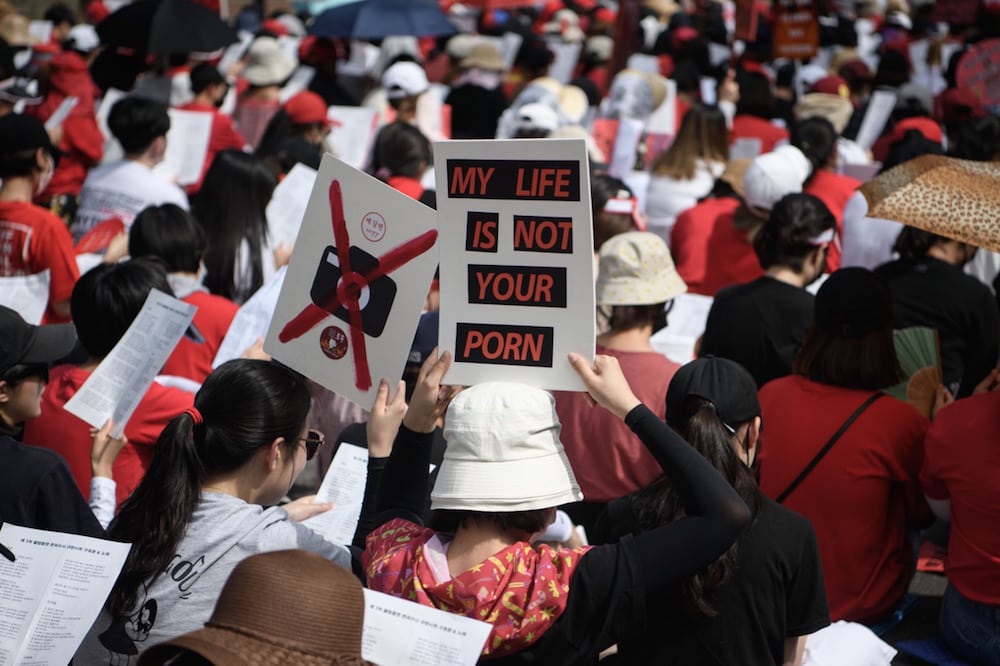The new report by Human Rights Watch titled, “‘My Life is Not Your Porn’: Digital Sex Crimes in South Korea”, is based on 38 interviews with survivors of digital sex crimes and experts, and an online survey of survivors.
This statement was originally published on hrw.org on 15 June 2021.
Government response to digital sex crimes inadequate
Widespread internet posting in South Korea of sexual images of women and girls without their consent is having a devastating impact on the victims, Human Rights Watch said today. The government should be doing more to prevent and respond to these digital sex crimes.
The 96-page report, “‘My Life is Not Your Porn’: Digital Sex Crimes in South Korea” found that despite legal reforms in South Korea, women and girls targeted in digital sex crimes – acts of online and tech-enabled gender-based violence – face significant difficulty in pursuing criminal cases and civil remedies, in part due to entrenched gender inequity. Digital sex crimes are crimes involving digital images – almost always of women and girls – that are captured without the victim’s consent, shared nonconsensually, or sometimes manipulated or faked.
“Officials in the criminal legal system – most of whom are men – often seem to simply not understand, or not accept, that these are very serious crimes,” said Heather Barr, interim co-director of women’s rights at Human Rights Watch and author of the report. “Anyone who has ever viewed one of these nonconsensual images could have taken a screen shot and can share that screen shot any time, on any website, from which it may spread uncontrollably. Survivors are forced to deal with these crimes for the rest of their lives – with little assistance from the legal system.”
The report is based on 38 interviews, with survivors of digital sex crimes and experts, and an online survey of survivors.
In 2008, fewer than 4 percent of sex crime prosecutions in South Korea involved illegal filming. By 2017 the number of these cases had increased elevenfold, from 585 cases to 6,615, and constituted 20 percent of sex crime prosecutions. Much of the public attention to digital sex crimes was initially driven by the use of tiny cameras (“spycams”) to covertly record footage in places like toilets, changing rooms, and hotels, with those placing the cameras sometimes earning money by selling the footage.
The women and girls targeted face major barriers to justice. Police often refuse to accept their complaints and behave in abusive ways, minimizing harm, blaming them, treating images insensitively, and engaging in inappropriate interrogation. When cases move ahead, survivors struggle to obtain information about their cases and to have their voices heard by the court.
In 2019, prosecutors dropped 43.5 percent of sexual digital crimes cases, compared with 27.7 percent of homicide cases and 19 percent of robbery cases. Judges often impose low sentences – in 2020, 79 percent of those convicted of capturing intimate images without consent received a suspended sentence, a fine, or a combination of the two. Fifty-two percent received only a suspended sentence. The problems survivors face in the justice system are exacerbated by a lack of women police, prosecutors, and judges.
Civil remedies such as a court order compelling the guilty party to delete images or pay damages to a victim are not easily available. When a civil claim is brought based on facts that are also the subject of a criminal prosecution, it is common practice to defer the civil action until the conclusion of the criminal case. This means survivors cannot seek assistance during the time when it may be most needed.
Survivors are typically too exhausted and traumatized by the end of a criminal trial – and sometimes multiple appeals, over the course of several years – to initiate a new proceeding in civil court, even if the criminal case has established facts that would support such a case. Filing a civil complaint would require victims to indicate their names and addresses, making this information available to the public, including to the person who committed the crime, something few survivors are comfortable doing.
“Digital sex crimes have become so common, and so feared, in South Korea that they are affecting the quality of life of all women and girls,” said Barr. “Women and girls told us they avoided using public toilets and felt anxious about hidden cameras in public and even in their homes. An alarming number of survivors of digital sex crimes said they had considered suicide.”
South Korea’s government and National Assembly have taken some important steps in recent years to reform the law and provide services to people experiencing digital sex crimes – largely in response to mass protests by activists in 2018. But these measures are still inadequate, in part because they have failed to grapple with deep forms of gender inequity that fuel and normalize digital sex crimes. In the 2021 World Economic Forum Global Gender Gap ranking, South Korea ranked 102 out of 156 countries, with the largest gap on economic participation and opportunity of any advanced economy.
South Korean women do four times as much unpaid work as men and face a 32.5 percent gender pay gap. Gender-based violence is widespread – in a 2017 survey of 2,000 South Korean men, nearly 80 percent of respondents admitted to violent acts against an intimate partner – compared with the global estimates that one in three women experience such violence. The national sexual education curriculum, issued in 2015, has been widely criticized for perpetuating harmful gender stereotypes.
“The root cause of digital sex crimes in South Korea is widely accepted harmful views about and conduct toward women and girls that the government urgently needs to address,” Barr said. “The government has tinkered with the law but has not sent a clear and forceful message that women and men are equal, and misogyny is unacceptable.”



